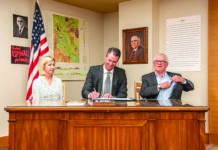
The Sustainability Council has successfully worked to implement new procedures that are environmentally friendly.
In the 2020-2021 school year, the organization and the students who run it pushed the Associated Student Government to pass a joint resolution that gave Colorado Mesa University (CMU) the push they needed to make these changes.
“We’ve worked with Sodexo to replace all single-use Styrofoam in the dining hall, along with plastic utensils, with reusable options. The result now is that we are producing substantially less waste in the [University Center],” Sustainability Council President Ryan Biller said.
Another new student driven change coming is the opening of a store titled New Way Refillery. This store will sell detergents, soaps and other hygiene products for students at a reasonable price. These products will be sustainable, palm oil free and organic. The students are currently holding small booths in residence halls with these products.
“[It’s] crazy to think that we’ll have a store dedicated entirely to sustainability on campus. They are set to open Nov. 1 [and] they are located at 936 North Avenue Unit 102,” Biller said.
All these initiatives have been student led with some guidance from faculty members. Biller stated that their constant efforts and group activities is what pushed administration to listen. He emphasized that students are paying to attend CMU and should use their voice to persuade change in the school and staff we are funding.

Water has also been a hot topic in the conversation of making the campus more sustainable. Colorado being in a drought has brought significant worry to students and faculty about the water usage on campus and how to change systems to work toward a better conservation standard. CMU is known for greenery and landscapes, which are the main culprits for how much water is used on a day to day basis.
“We live in a desert, but we have beautiful green lawns, we have a lot of water use here in Grand Junction that is for non agriculture, or what we call hygiene or consumption use. Agriculture is hurting right now. In the sense of water availability and increased temperatures, farmers and ranchers here in the Grand Valley are already feeling that,” Assistant Professor of Environmental Sciences Christopher Cohu said. “They consume about 70% of water used for human use. Personal uses are at about 10%. So there’s marginal gains and in the 10% that we use are for things like landscaping and such. I know people like to pick on golf courses, but generally speaking, any way that we can reduce our water use then allows for more water for agricultural purposes.”
Biller and Cohu emphasized that students are the main change makers in CMU’s system. Cohu stated that when students use their voices, we see monumental change being made. Sustainability Council is proof that administration will listen to a general consensus when enough people are willing to push for it.
“We have lofty goals, but we cannot accomplish them by a handful of driven students who will only be here for a few years. To create lasting continuity that persists in improving our campus and the living world, we need more students getting involved,” Biller said.



